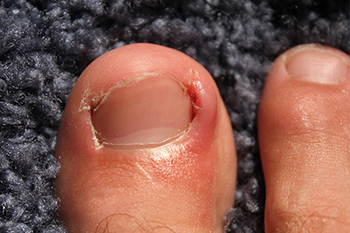
An ingrown toenail happens when the nail grows into the skin instead of over it. Common reasons for this to occur can be from wearing shoes that do not fit correctly, or if there is a family history of it. Additionally, people who trim their toenails incorrectly or have injured their toes may develop an ingrown toenail. People who have diabetes can incur poor circulation, which may inhibit normal nail growth, thus increasing the possibility of getting an ingrown toenail. Mild relief may temporarily be found when the affected foot is soaked in warm water, making it easier to gently pull the skin away from the nail. Preventive techniques can include wearing shoes that fit correctly and keeping the feet as dry as possible. If you have developed an ingrown toenail, it is strongly suggested that you consult a podiatrist as quickly as possible who can provide you with permanent relief and treatment options.
Ingrown toenails may initially present themselves as a minor discomfort, but they may progress into an infection in the skin without proper treatment. For more information about ingrown toenails, contact our doctors of Foot & Ankle Center of Oklahoma. Our doctors can provide the care you need to keep you pain-free and on your feet.
Ingrown Toenails
Ingrown toenails are caused when the corner or side of a toenail grows into the soft flesh surrounding it. They often result in redness, swelling, pain, and in some cases, infection. This condition typically affects the big toe and may recur if it is not treated properly.
Causes
- Improper toenail trimming
- Genetics
- Improper shoe fitting
- Injury from pedicures or nail picking
- Abnormal gait
- Poor hygiene
You are more likely to develop an ingrown toenail if you are obese, have diabetes, arthritis, or have any fungal infection in your nails. Additionally, people who have foot or toe deformities are at a higher risk of developing an ingrown toenail.
Symptoms
Some symptoms of ingrown toenails are redness, swelling, and pain. In rare cases, there may be a yellowish drainage coming from the nail.
Treatment
Ignoring an ingrown toenail can have serious complications. Infections of the nail border can progress to a deeper soft-tissue infection, which can then turn into a bone infection. You should always speak with your podiatrist if you suspect you have an ingrown toenail, especially if you have diabetes or poor circulation.
If you have any questions, please feel free to contact our offices located in Oklahoma City and Yukon, OK . We offer the newest diagnostic and treatment technologies for all your foot care needs.
